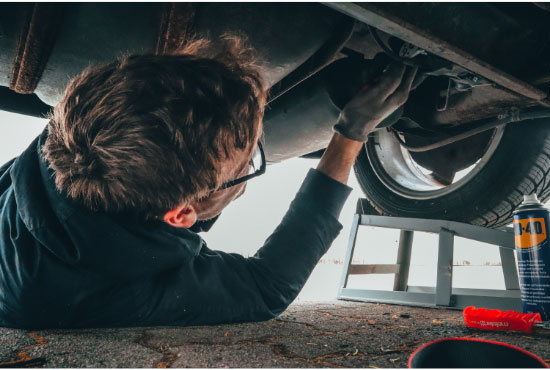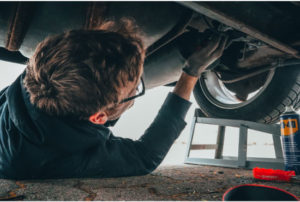If you want to see a concerned look on the driver of a Jeep let them hear a loud popping sound emitting from their vehicle. Their brows will knit and they will emit long sighs. Loud popping sounds can mean real trouble.
Loud popping sounds can also mean nothing at all is wrong. You have to note when you heard the sound, the surface you were driving over, and how frequently you have heard the sound.
A one-time sound needs to be checked but do not get worried until you start to hear the noise frequently under the same circumstances.
Identify The Noise

You cannot identify the cause of a sound you heard unless you do some checking on your vehicle and consider what you were doing at the time you heard the sound.
Things to Consider about the Noise
- When you heard the noise what surface were you driving over
- Were the weather conditions unusual at the time?
- What speed were you traveling?
- Were you executing a turn at the time?
- Was there an unusual load on the vehicle because you were towing something
- Where did the sound seem to be coming from? The steering, the undercarriage, the brakes, the wheels, the passenger side, the driver side, or the rear of the vehicle
- Was the radio playing
- Did you have a CB radio functioning at the time?
- Did you have a walkie-talkie or other device turned on at the time?
Once you have identified what you were doing at the time the noise occurred it will be easier to diagnose the cause of the sound.
Tires
The tires that you have on the vehicle may be causing the unusual sounds, popping, clicking or clunking that you hear when you are turning. The surface you are driving over may also be the reason you are hearing odd sounds.
Tires that are designed to help you navigate through mud and snow may make very strange sounds when you try and navigate across paved roads or hard dry surfaces. Before you get too concerned about a popping noise try to discern the cause by considering the following.
Driving in 4 Wheel Drive
Your 4-wheel drive vehicle is not designed to be driven in 4-wheel drive all of the time. It is designed to be placed into 4-wheel drive when you are driving under circumstances that might make it hard for the vehicle to continue to move forward.
If you are driving on a hard surface with no danger of sliding, slipping or getting stuck and you have the vehicle in 4-wheel drive, then that could be the cause of the popping sound.
Solution:
Try driving the vehicle again with it, not in 4-wheel drive, and see if the sound occurs again.
U-Joints
U-Joints are notorious for making popping sounds. The sounds may be caused by a joint that is under stress or it could be a joint that is about to break. If you suspect the u-joints are the source of the popping sound you should check the vehicle.
Checking the U-Joint
One method of checking your u-joint is to jack the vehicle up and get the weight and pressure off of the tires. You need to be parked on a firm and level surface when you do this.
Once the weight is off of the tire place one hand on top of the tire and one hand on the bottom of the tire. Try to rock the tire. If you are able to move that tire then your u-joint requires more in-depth investigations.
Solution:
Change the u-joint yourself or go see a mechanic and let them confirm your suspicions. U-joints, do not cost a lot to replace even if you have the work done by a professional.
CV Joints
Your CV joints could be causing the popping sound. These popping sounds could occur if you are off-road driving and the CV joints are placed under unusual stress do to the road surface, speed, or other conditions.
One way to be confirm a suspicion of a CV joint that is going out is to look for tell-tale signs like grease on the inner side of the tire. There should be no grease on the inside of your tire so if you run your hand around the tire and get grease on your hand there is a good chance that your CV joint is going out.
If your CV joint completely fails the vehicle will not move at all. So if you are hearing clicking noises and suspect these joints you know that they are not completely out but they could go out at any minute. You do not want to drive the vehicle until you are certain that the CV joints are not the cause of your mysterious noise.
A vehicle has two CV joints, the inner join, and the outer joint. To test the assumption you have that the joints are failing try turning a complete circle with the vehicle. Roll the windows down, turn the radio off, turn the ac and heater off, and listen very carefully as you make the circle. If you hear the popping sound at this time then it is time to get those CV joints thoroughly examined.
Another tell-tale sign that the CV joint is going bad is a vibration felt in the steering wheel. The more you accelerate the worse the vibration will get if the CV joints are going out.
Jack the vehicle up enough that you can get under it. While you are under the vehicle visually inspect the CV joint to see if the boot around the end of the joint shows any sign of wear like cracking or grease on the outside of the boot. If you see grease on the outside you need to change the joint the boot is compromised.
Solution:
Do CV joint maintenance or see a professional about changing the joints.
Tips From Pros
- Never ignore a popping or clicking sound. It is better to be safe than sorry.
- Check your tires often for signs of extra wear on the inside or outside of the tire. This extreme wear on just one portion of the tire is a sign of a bad u-joint.
Frequently Asked Questions
Do All 4-Wheel Drive Vehicles Have CV Joints?
Yes and no. Some vehicles have solid front axles that contain the CV joints so you do not have to do any maintenance or repairs on them.
Are CV Joints Expensive to Repair?
The cost of repairing or replacing CV joints is determined by the vehicle’s make and model. Typically, you will not spend more than $300 to get this type of repair done on most vehicles.
If My U-Joint Fails While I Am Driving Will I Wreck The Vehicle?
If the u-joint fails while you are driving you could very possibly have an accident.
Final Thoughts
Popping and clicking sounds can be indications of small parts that need some maintenance and attention. Making a habit of regularly checking your CV joints and u-joints could help prevent a serious problem when they break. Take every popping sound seriously, but do not get too excited about them until you have done a thorough inspection. If you cannot find the source of the sound always ask a professional for advice.

